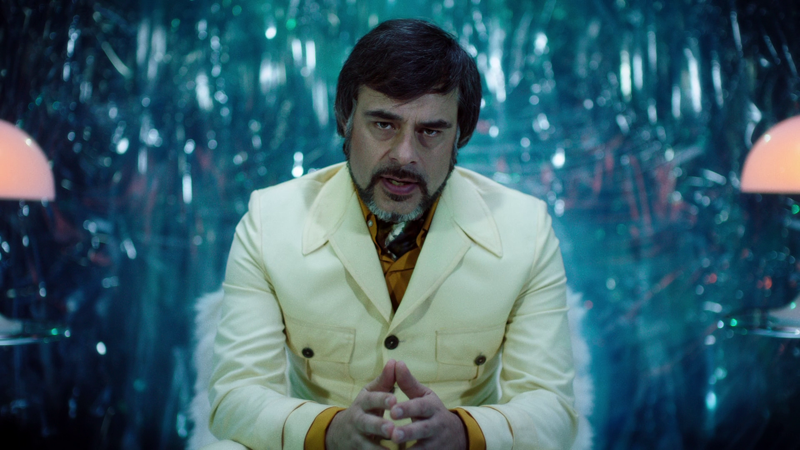| Reviews & Columns |
|
Reviews DVD TV on DVD Blu-ray 4K UHD International DVDs In Theaters Reviews by Studio Video Games Features Collector Series DVDs Easter Egg Database Interviews DVD Talk Radio Feature Articles Columns Anime Talk DVD Savant Horror DVDs The M.O.D. Squad Art House HD Talk Silent DVD
|
DVD Talk Forum |
|
|
| Resources |
|
DVD Price Search Customer Service #'s RCE Info Links |
|
Columns
|
|
|
Legion Season 1
The thinking person's X-Men adventure

Loves: Visual spectacles, freak-outs, Aubrey Plaza, Jemaine Clement
Likes: hidden clues
Dislikes: The limitations of unreliable reality
Hates: bringing comic knowledge to live-action viewing
The Show
The logo for Legion has that iconic X in a circle icon, and the show features mutants and references characters and ideas from the history of X-Men comic books, but it is not an X-Men series. There are strange powers and massive battles and a need to save the world from unseen forces, but it is not a superhero adventure. Rather, Legion, created by Fargo adapter Noah Hawley, takes one of the more unusual characters from the world of Wolverine and Deadpool--David Haller (Dan Stevens), the psychologically-damaged son of X-Men founder Professor Charles Xavier--and tells an artsy, trippy tale of mental illness and conspiracy, the kind of show the average fan of spandex-clad antics might actively attempt to avoid.
Starting out in flashbacks, the storyline is relatively simple at the beginning: David--a recovering addict and schizophrenic--is in Clockworks, a mental hospital, and he falls in love with a new patient named Syd (Rachel Keller) who doesn't let anyone touch her. It gets weird when she is about to be released, they kiss, and they switch bodies. Everything goes haywire, reality is twisted and a bunch of people die. That brings Division III--a government agency--into the picture, as they try to figure out exactly what they have on their hands in David. It also earns the attention of the folks at Summerland, who also are interested in David, for reasons that will become clear. So, obviously, the two groups are struggling to get the possible human bomb on their side.
Beyond the battle between Division III and Summerland is the mystery of David. A blend of unusual memories and visions reveals that his issues (and abilities) may not entirely be in his head, and the team at Summerland--including memory investigator Ptonomy (Jeremie Harris), a fighter (Amber Midthunder) and thinker (Bill Irwin) who share one body in Kerry/Cary Loudermilk, and team leader Dr. Melanie Bird (Jean Smart)--are determined to figure out what's going on, especially since it seems to involve Melanie's comatose husband Oliver (Jemaine Clement). There are also questions to be answered regarding David's oft-present, off-putting pal Lenny (Aubrey Plaza), a remnant of his drug-abuse days and a constant reminder that things are not right.

The show's mysteries are parceled out over the first season's eight episodes, with enough info given to satisfyingly string you along until the next reveal. (There are also a good number of mini-mysteries or clues in the backgrounds of scenes for viewers to rewind and obsess over. These can pay off story-wise, though sometimes they just add to the atmosphere.) While the story is certainly engaging--there's no point where you stop wanting to know what's going to happen next--Legion is as much about feel as it is plot. The aesthetics of the show help place the viewer into the mindset of David, keeping you off-kilter and unsure of what is real and what is imagined. This is a series that seamlessly moves from animation to dance number to dream sequence to flashback without breaking a sweat. There's an artistry to the show that is rarely, if ever seen on TV--the roster of directors unsurprisingly includes a number of award-winning talents--to the point where you could almost accuse the series of placing style above substance, but so much of how the show looks and sounds informs how the story is processed by the audience. Legion does what virtual reality has always promised it could do.
Of course, that wouldn't work without the right cast for this great directors to work with, and Legion has an embarrassment of riches in this regard. Stevens is wonderful as David, a classically-handsome leading man/action hero, but capable of projecting a broken spirit beautifully. His demeanor when portraying a drug-addled David gives just enough to indicate a different version of the character, without tipping over into parody. Paired with Keller, he is half of a swoon-worthy set of star-crossed lovers, as Keller is open and inviting, yet guarding secrets and possibly something dark in her life. Keller has to carry a lot of weight when it comes to grounding this series, and she does so well, even if her character, at times, exists mainly in service to David's story.
The rest of the cast does a fine job of creating a believable world out of some very hard-to-believe ingredients, with Midthunder and Harris being particularly enjoyable in their difficult cohabitation scenario and Plaza demanding attention at every appearance. Of course, Clement is a definite scene-stealer as Oliver (an unavoidable reality with his charm and his character's wardrobe.) There comes points where all you want from Legion is to put Stevens and Clement in a room and let them do their thing, which thankfully they do. For a series that is very much about the spectacle, the show also understands the understated and gives its actors room to work.
One of the things that's most interesting about this series is how little it seems to care about its source material. And that's really for the best. The show certainly makes nods to its comic-book roots, referencing characters and ideas from X-Men, including the tangentially touched-upon fact that David's father is Professor X, but it in no way seems beholden to fan service. A name might catch your ear, and a visual may suggest a well-known character, but this is not the Marvel Cinematic Universe. Personally, I have a theory as to what this all means in the end, but we'll have to see how it plays out on the show. Until then, the comic-book stuff will keep Reddit boards humming, and the story will stand on its own, free from expectations and continuity.
The only issue with Legion, and it's an issue with any show, movie or book that involves an unreliable narrator (or many for that matter) or a liquid perception of reality (like with anything involving shapeshifters): nothing really means anything. Anything that you are shown or told in Legion means as much as anything else, so you can only put so much faith, belief or care into what you are seeing. It's a narrative handicap that comes with all fantasy/sci-fi works that introduce these ideas, and it weakens the ability of the viewer to truly buy in, because it could all just be a dream or a hallucination. But at the same time, those thin barriers between possibilities opens up the series to do just about anything, and that freedom, in the hands of artists, is a wondrous thing.

The Discs
The eight episodes of the first season of Legion arrives on two Blu-ray discs, packed into a standard-width, dual-hubbed Blu-ray keepcase with a two-sided cover featuring an episode guide on the inside. Series-inspired animated menus offer a choice to select episodes, adjust the setup, navigate timelines and check out the special features (on the second disc). Audio options include English 5.1 DTS-HD Master Audio, French 5.1 DTS and Spanish and Portuguese 2.0 Dolby Digital tracks, while subtitles are available in English SDH, Spanish, French, Danish, Dutch, Finnish, Norwegian, Portuguese and Swedish.
The Quality
The first season of Legion arrives with 1.78:1, 1080p, AVC-encoded transfers that present the show's gorgeous visuals beautifully. Legion gets really varied in its look, feeling unrestrained by things like reality or expectations, and as a result the show has a load of eyecandy to enjoy. At the same time, it's hard to pick out where problems might exist, because it could just be a matter of style, like the use of soft-focus and manipulated saturation. That said, nothing looks "off" in an unintentional way, and there's a high level of fine detail, well-applied and consistent video grain and nicely vivid color (where appropriate). Digital distractions are not a concern.
When it comes to creating a really disorienting experience for the viewer (simulating David's increasingly unstable mind) sound is as important as the image, if not more so, as the experience through the ears is more subconscious than the visuals. That's where the 5.1 DTS-HD Master Audio tracks really pay off, as the surrounds are used to pass barely audible cues around you to create an uneasy feeling, before punching you with well-timed blasts from the low-end. The sound design really shines here, with action coming from all over the room, while voices are crisp and clean and music is well prioritized in the mix. This presentation really adds to the experience of the show.
The Extras
The extras here are somewhat disappointing, especially compared to what came with Hawley's Fargo series. We start with 26:50 of Deleted Scenes. The problem when it comes to getting handed a pile of deleted scenes for a decidedly non-linear show like Legion is trying to place them in some kind of context. It's not all deleted scenes, as there are some alternate takes of segments from the show, including a different version of the big dance sequence from the beginning of the season. Some scenes include uncompleted green-screen elements, for something of a behind-the-scenes peek.
A featurette focused on the show as a whole, "Fractured Reality: A Different Kind of Hero" runs 10:35, and features interviews with Hawley, some of his crew and most of the main cast (with one notable, unfortunate, Kiwi absence). They touch on a number of the elements that make Legion work so well, including the characters, the special effects and the design of the show, as well as discussing the casting of Plaza, the freedom that comes with an unreliable narrator and the character's iconic comic-book hair.
The extras wrap with a "Legion: Inside Look", a set of seven shorter featurettes (a combined 19:22) that are shorter, more focused versions of the previous extra, covering a variety of the show's parts, both from a plot and character perspective and behind-the-scenes insight. These were created to promote the show, so they are more about introductions than insight. "Uncanny Romance" looks at the show's core relationships, and how they are intensified by the series' mutant element, while "Production Design" goes slightly deeper into the look of the show, including some notes on how the sets were conceived. "Powers" is about the superhuman capabilities of the characters and how they inform the characters, "Make Up" is pretty self-explanatory, illustrated by the development of the Devil with the Yellow Eyes, as is "Visual Effects," in which effects supervisor John Ross and Hawley show and explains how two early sequences were shot. In "Costume Design", Costume Designer Carol Case gets some spotlight and shows off sketches and tours the wardrobe racks to discuss the plan for the clothes on the show, while the cast praises her work, while things wrap up in "Location", an element that plays heavily into the timeless, unknowable settings.

The Bottom Line
Marvel's movies have achieved great results by taking the characters and ideas we've known and casting them into different genres and tones, giving them fresh new life. Legion is very much the same, but on an entirely different level, trying something completely different and utterly fearless. The result: TV more artistically interesting and engaging than just about anything the form has offered before. This first season is presented in excellent shape, with a handful of bonus content, but the real draw is the chance to revisit the mystery, or dive in for the first time.
Francis Rizzo III is a native Long Islander, where he works in academia. In his spare time, he enjoys watching hockey, writing and spending time with his wife, daughter and puppy.Follow him on Twitter
*The Reviewer's Bias section is an attempt to help readers use the review to its best effect. By knowing where the reviewer's biases lie on the film's subject matter, one can read the review with the right mindset.
|
| Popular Reviews |
| Sponsored Links |
|
|
| Sponsored Links |
|
|
| Release List | Reviews | Shop | Newsletter | Forum | DVD Giveaways | Blu-Ray | Advertise |
|
Copyright 2024 DVDTalk.com All Rights Reserved. Legal Info, Privacy Policy, Terms of Use,
Manage Preferences,
Your Privacy Choices | |||||||














